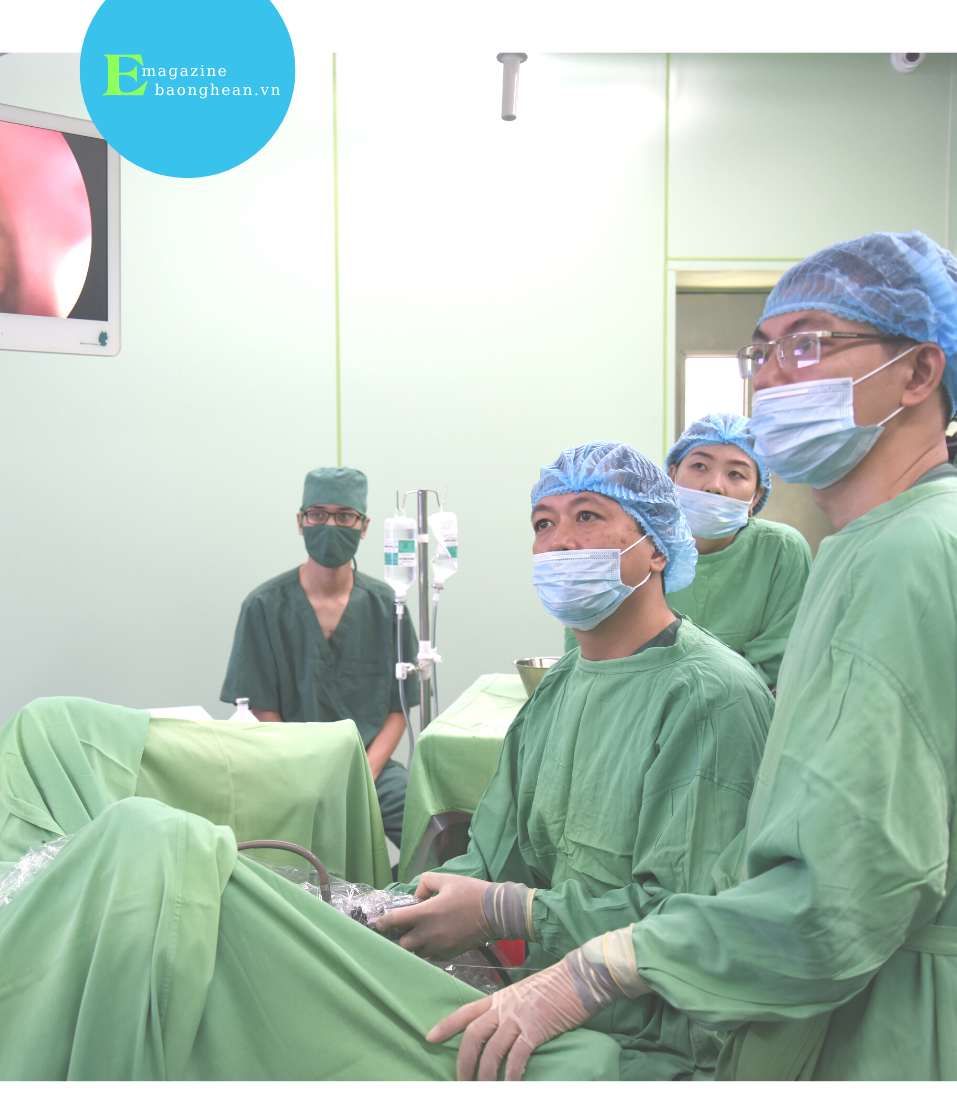



For over 10 years, Nghi Loc General Hospital has reluctantly become a "human resource supply" for a number of non-public hospitals in the province and the region. Since 2012, this hospital has "lost" 8 doctors with specialist level 1 qualifications and at least 10 years of working experience. Since the beginning of 2021, 3 doctors considered to be the pillars of the hospital have resigned and transferred to work at private hospitals.

Dr. Nguyen Huy Phuc – Director of Nghi Loc General Hospital, said that the unit became a “victim” of brain drain starting in 2012 – the time when a private hospital in the area expanded its operations. This private hospital “secretly” contacted each doctor privately, including Mr. Phuc himself (at that time the Deputy Director of the Hospital). Before that, another private hospital also contacted and invited 5 doctors from Nghi Loc General Hospital.
3 “pillar” doctors that Nghi Loc General Hospital has been “attracted” to leave in the past year, including 1 Head of Pediatrics, 1 Deputy Head of Obstetrics and 1 Deputy Head of Cardiology… In addition, there is another doctor who asked for a temporary leave of absence to take the exam for a specialist level 1 at a hospital in the South and has now returned to work as usual. 1 nursing bachelor asked for leave of absence to reunite with his family.
The income before moving to the Department of Obstetrics and Gynecology was 17.8 million VND/month, the Head of the Department of Pediatrics was 16 million VND/month, the Deputy Head of the Department of Cardiology was 14.5 million VND/month. When moving to a non-public unit, these doctors are receiving attractive salaries 1.5 - 2 times higher than the salary at their old unit.

Doctor Phuc said that recently, Nghi Loc General Hospital has made many efforts to increase the income of medical staff and employees. Even during the Covid-19 pandemic, the hospital also ensured that doctors had an additional allowance of 2-5 million VND/month, in addition to their general salary. However, these efforts still could not meet the wishes of doctors.
“When you first start working, all doctors cannot work immediately, but need to be trained and nurtured by the hospital from the initial specialty, specialty 1 and if you are capable, continue to train in specialty 2. As a unit that implements financial autonomy, the funding for training and nurturing doctors is not provided by the State but is the money the unit earns and saves,” Dr. Phuc said about the gaps left after good doctors leave.
With the 3 doctors who just left, before going to study for the first specialty, Nghi Loc General Hospital asked them to commit to working at the unit for at least 10 years after finishing their studies. If they violated the commitment, they would be reimbursed according to regulations. The hospital also spent nearly 1.1 billion VND in tuition fees for them; during their studies, they still paid their salaries; and arranged for someone to replace the students. After they returned from school, they received 40 million VND in government support to attract them... However, sadly, after only 3 years of working, the 3 doctors violated their commitment and left.

“Health care workers and civil servants themselves always love their jobs and their agencies and want to contribute in the public sector. However, the vast majority are forced to leave due to their family's economic conditions. In non-public facilities, they pay only 10 million VND more, but that 10 million VND has already solved many expenses... Even though we have to leave, deep down we still want to stay,” said Dr. NHD to us. Dr. D. moved from a public hospital to a private hospital in 2021.

Doctor D. believes that, to be fair, in the process of training and improving skills, medical staff and civil servants themselves also have to spend a lot of money. For example, in the process of writing a thesis, the student himself has to spend certain costs such as costs for collecting specimens, paying for patients who agree to research and re-examination, travel, etc. In Nghe An province, there are also policies and regulations to attract high-quality human resources, but these policies and regulations are only for encouragement and cannot compensate for the costs that individuals spend on studying.
Having also experienced the same reality as Dr. D., another doctor said that when switching to work in a non-public environment, the doctor himself also faces other "pressures" from the business owner - that is, the number of people examined and treated, the ability to attract patients. The initial salary is high but does not guarantee that it will increase or remain stable later. This salary also depends on whether or not the target is met. Non-public facilities do not recruit people to sit around but to "lay golden eggs". So, please do not blame many people for leaving - they are having to think short-term, having to take risks when having to give up a stable, long-term job in a public facility.

Similarly, Dr. HH said that the current working environment in public facilities does not really meet the requirements of officials and civil servants. The public environment has a lot of pressure but has not been properly encouraged and evaluated by patients, society and even management levels. That leads to the mentality that they are not evaluated fairly and objectively. Meanwhile, working in private hospitals, they feel comfortable and secure because their abilities are properly evaluated. Besides, to improve the quality of examination, diagnosis and treatment, it is necessary to have enough medicine and medical supplies, only then will doctors be able to contribute and use their experience to serve patients. However, in public hospitals, there is still a lack of medicine, medical supplies and medical equipment, while in private hospitals, there is a ready supply of medicine, medical supplies and medical equipment... Many times, public doctors have been misunderstood because they prescribe outside drugs for patients.

As mentioned, the fact that health officials and employees quit their jobs and move to non-public health facilities leaves a gap in people's health care with significant consequences. First of all, it must be affirmed that the employees who quit their jobs are all trained and experienced. Therefore, this has directly affected the development of technical expertise and operations at public health facilities; and the development and quality of the grassroots health network in general. After health officials and employees quit their jobs and move to non-public health facilities, it will take many more years for public health facilities to train a generation of skilled and professionally qualified staff.

Dr. Nguyen Hong Truong - Director of Vinh City General Hospital said that it is clear that public health facilities are suffering losses. But the biggest losers when this happens are the patients, especially the poor patients. "Patients with good economic conditions have many options for medical examination, treatment and health care. As for poor patients, they have always tended to choose public facilities for medical examination and treatment because they cannot afford the costs at non-public facilities. If public health facilities lose good human resources, the rights of poor patients will be affected the most," said Mr. Truong.


